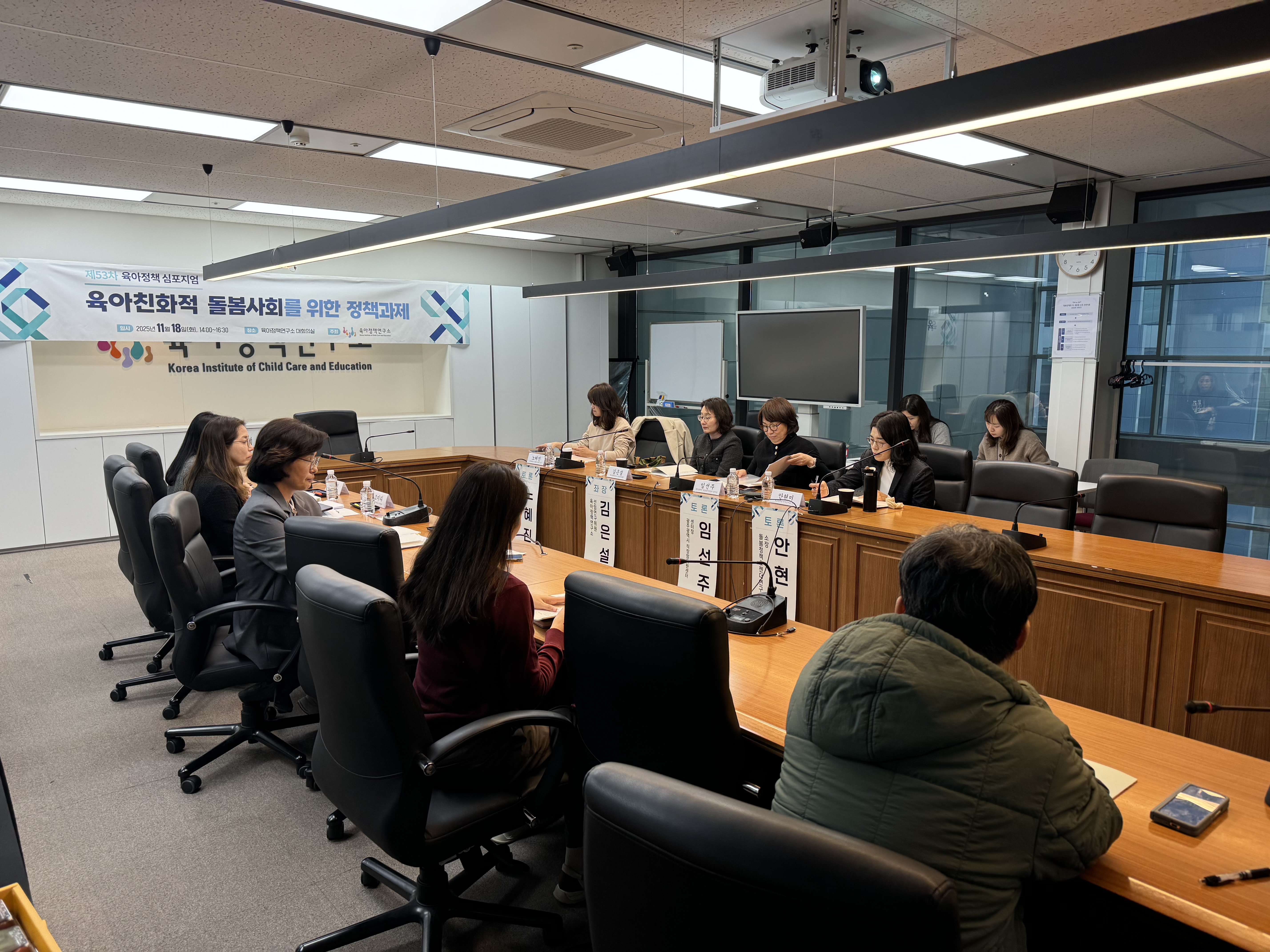Events
- Events
- Seminars
Seminars
- Date
- 2025.11.20
- Writer
- 주송희
- Hit
- 9
KICCE Concludes the 53rd Childcare Policy Symposium
– Policy Tasks for a Parenting-Friendly Care Society –
The Korea Institute of Child Care and Education (KICCE, President Ock Kyeung Hwang) held the 53rd Childcare Policy Symposium on Tuesday, November 18, 2025, at 2:00 p.m. in the main conference room on the 9th floor of the Myeongdong Post Tower. The symposium, under the theme “Policy Tasks for a Parenting-Friendly Care Society,” was organized as a venue for in-depth discussion on how Korean society can move toward a parenting-friendly care society by building an integrated care system, drawing on the main findings of KICCE’s recent research.
The symposium featured two thematic presentations and a designated discussion session focusing on integrated approaches to care through linkage and cooperation—specifically, regional corporate support and improving access to home-based parenting support services.
In the first presentation, Mira Cho, Research Fellow at KICCE, presented the findings of a study analyzing childcare-friendly infrastructure and governance characteristics in five areas with a high concentration of companies. She proposed detailed policy measures based on three main directions: establishing differentiated support strategies that reflect the characteristics of corporate-concentrated areas, building support systems tailored to the roles and characteristics of different stakeholders, and developing multi-layered support systems for small and medium-sized enterprises.
In the second presentation, Yoon Kyung Choi, Senior Research Fellow at KICCE, reviewed key issues and areas for improvement in existing home-based parenting support services—such as the Home Childcare Service, part-time childcare, Childcare Support Centers, and Shared Parenting Support Centers—and suggested policy directions to enhance service accessibility. She emphasized the need to reorganize the public care support system by “re-mapping” home-based parenting support as a core pillar of local care ecosystems.
The designated discussion was moderated by Eun-Seol Kim, Head of the Office of Fertility Support Policy Research at KICCE. Discussants included Hye-Jin Noh, Professor in the Department of Social Welfare at Gangseo University;
Seonju Lim, Director of the Gwangju Metropolitan City Working Mom Support Center; Hyeonn Mi Ahn, Director of the Care Policy & Gender Research Institute; and So Young Kim, Research Fellow at the Korean Women’s Development Institute (KWDI).
Professor Hye-Jin Noh highlighted the need to distinguish between measures through which companies and local communities support the work–family balance of parents, and measures through which local communities support companies in turn so as to facilitate parents’ work–family balance. She stressed the importance of concretizing networks and linkages among companies, the government, and local communities, and of clarifying the roles and functions of intermediary support organizations.
Director Seonju Lim drew on examples from Buk-gu, Gwangju, to illustrate the difficulties faced by small workplaces and the administrative burden experienced in the field. She emphasized that, rather than creating new consultative bodies, it is crucial to make effective use of existing resources and to develop concrete, implementable projects at the local government level.
Director Hyeonn Mi Ahn proposed specific improvement tasks for home-based care services, including the establishment of regionally tailored support systems for the Home Childcare Service, the introduction of dedicated part-time childcare centers, and the reorganization of roles and functions between Childcare Support Centers and Family Centers. She also underscored the need to build an integrated childcare system through coherent制度 design and standardized criteria.
Research Fellow So Young Kim agreed on the importance of region-specific responses and differentiated strategies to enhance access to home-based parenting support services. She emphasized the need for locally driven, customized strategies, careful consideration of the appropriate scale for each service, and the integration and linkage of direct support services with participatory programs to increase policy effectiveness.

- PREV
- Award Ceremony for the 2025 Contest on New Policy Ideas from the Frontlines of Child Care Held
- 주송희
- 2025.11.17
- NEXT
- No next article.